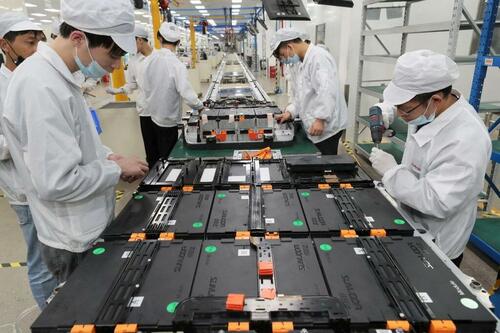
Authored by Catherine Yang via The Epoch Times (emphasis ours),
Jose Fernandez, U.S. undersecretary of state for economic growth, energy, and the environment, told reporters in Portugal on Oct. 8 that the Chinese regime is using its oversupply of lithium to price out global rivals.

“They engage in predatory pricing,” Fernandez said. “[They] lower the price until competition disappears. That is what is happening.”
Fernandez said China was producing much more lithium “than the world needs today, by far” and dumping it on the market, resulting in a steep price drop of 80 percent over the past year. China is now responsible for two-thirds of the world’s refined, battery-grade lithium production.
Portugal has 270,000 metric tons of lithium reserves, according to the 2022 U.S. Geological Survey, and its government has set goals to increase mining to advance energy goals. Local communities have opposed some of these new projects, saying they damage livelihoods and the environment.
Western countries have, in recent months, put up barriers against the Chinese Communist Party’s (CCP’s) trade practices. Although China joined the World Trade Organization in 2001, China is not a free-market economy, as its industries produce based on the state goals set by the authoritarian CCP.
For example, the European Union raised tariffs on Chinese electric vehicles only after determining via investigation that the regime had subsidized the industry to overproduce, subsequently dumping low-priced vehicles on the international market. This is a practice that can put global competitors out of business.
During a recent trip to Washington, Indian Minister of Commerce and Industry Piyush Goyal said China had “killed“ India’s manufacturing sector decades ago with the same tactic.
Asian countries have similarly hiked tariffs on Chinese imports. Japan this year increased duties on Chinese electrolytic manganese dioxide, another battery material, and Korea, whose electric vehicle market is already dominated by Chinese products, is cutting subsidies for vehicles using Chinese batteries.
Trade officials have recognized that tariffs alone may not be enough. Chinese manufacturers may partner with international manufacturers or trade partners to bypass tariffs. For instance, China manufacturers supply a large number of parts to Mexican manufacturers, and Mexico is the largest auto-parts supplier to the United States.
The about-face of China’s global trade partners in key industries also comes at a time when the Chinese communist regime is struggling to prop up a faltering economy. Chinese industries facing overcapacity may soon see firms shutter, with a ripple effect of job loss, lost revenue for already-indebted local governments, and social unrest due to unemployment.
Reuters contributed to this report.
Authored by Catherine Yang via The Epoch Times (emphasis ours),
Jose Fernandez, U.S. undersecretary of state for economic growth, energy, and the environment, told reporters in Portugal on Oct. 8 that the Chinese regime is using its oversupply of lithium to price out global rivals.

“They engage in predatory pricing,” Fernandez said. “[They] lower the price until competition disappears. That is what is happening.”
Fernandez said China was producing much more lithium “than the world needs today, by far” and dumping it on the market, resulting in a steep price drop of 80 percent over the past year. China is now responsible for two-thirds of the world’s refined, battery-grade lithium production.
Portugal has 270,000 metric tons of lithium reserves, according to the 2022 U.S. Geological Survey, and its government has set goals to increase mining to advance energy goals. Local communities have opposed some of these new projects, saying they damage livelihoods and the environment.
Western countries have, in recent months, put up barriers against the Chinese Communist Party’s (CCP’s) trade practices. Although China joined the World Trade Organization in 2001, China is not a free-market economy, as its industries produce based on the state goals set by the authoritarian CCP.
For example, the European Union raised tariffs on Chinese electric vehicles only after determining via investigation that the regime had subsidized the industry to overproduce, subsequently dumping low-priced vehicles on the international market. This is a practice that can put global competitors out of business.
During a recent trip to Washington, Indian Minister of Commerce and Industry Piyush Goyal said China had “killed“ India’s manufacturing sector decades ago with the same tactic.
Asian countries have similarly hiked tariffs on Chinese imports. Japan this year increased duties on Chinese electrolytic manganese dioxide, another battery material, and Korea, whose electric vehicle market is already dominated by Chinese products, is cutting subsidies for vehicles using Chinese batteries.
Trade officials have recognized that tariffs alone may not be enough. Chinese manufacturers may partner with international manufacturers or trade partners to bypass tariffs. For instance, China manufacturers supply a large number of parts to Mexican manufacturers, and Mexico is the largest auto-parts supplier to the United States.
The about-face of China’s global trade partners in key industries also comes at a time when the Chinese communist regime is struggling to prop up a faltering economy. Chinese industries facing overcapacity may soon see firms shutter, with a ripple effect of job loss, lost revenue for already-indebted local governments, and social unrest due to unemployment.
Reuters contributed to this report.
Loading…




